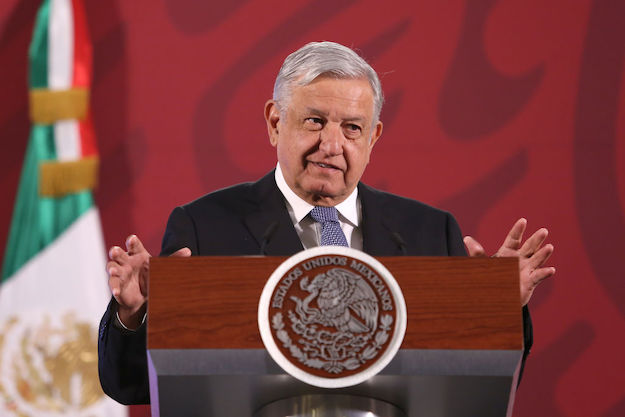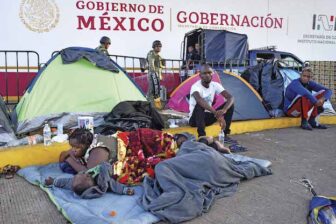This article has been updated
MEXICO CITY – With excellent medical schools, well-trained epidemiologists, a basic public healthcare system for low-income residents and plenty of hospitals and pharmacies, Mexico is in a relatively privileged position in Latin America when it comes to combatting the coronavirus.
But despite having most of the tools it needs to respond to the pandemic, underlying challenges – some longstanding and others the result of recent policy changes – have left experts concerned that the country’s health system could quickly be overwhelmed if the virus spreads as expected.
“The main strength in Mexico is that we have a good system of epidemiological oversight,” Fatima Masse, researcher at the Mexico Competitiveness Institute (IMCO), a think-tank, told AQ. “But I’m worried about the absence of clarity with respect to the tests for coronavirus, whether we can be sure about the number of cases.”
Part of the challenge is geography. Mexico’s stock of 4,629 hospitals, specialized institutes and health clinics is high by international standards; at 37.5 facilities per million residents, its per capita coverage is roughly on par with Germany (37.3) and nearly twice as high as the U.S. (17.1), Canada (19.7) and Italy (17.6).
But because the population is dispersed in far-flung communities in mountainous regions in states such as Tabasco, Chiapas, Oaxaca and Guerrero, many of Mexico’s hospitals are small and ill-equipped to handle a major outbreak. Despite its high number of hospitals, Mexico has just 1.3 hospital beds per 1,000 residents. In Italy, where health systems are already strained, the number is more than twice that. Efforts to slow the spread of the virus may also be affected by the fact that 56% of Mexico’s workers are employed in the informal economy, and may not be easily able to absorb the costs of staying home.
“It’s a train wreck you see coming, and you can’t stop it,” Tony Payan, a Mexico scholar at the Baker Institute at Rice University, told AQ.
Recent changes to the health system under President Andrés Manuel López Obrador, who initially downplayed the risks of the virus and even now continues to hold public appearances, could further complicate matters. When he entered office on Dec. 1, 2018, López Obrador promised an overhaul of Mexico’s public system with the goal of guaranteeing Mexicans free access to healthcare and medicine “like in Canada or the Nordic countries.”
Over 12.3 million residents rely on state-subsidized coverage through a program called IMSS-Bienestar; an additional 50 million depend on coverage through a state-run insurance scheme, which López Obrador has remodeled as the Instituto de Salud para el Bienestar (INSABI).
While López Obrador says that INSABI is ready to provide adequate health services at no cost to users, the roll-out of the new system has already been marked by service disruptions, and the internal institutional guidelines and regulations to govern the new system are still being drawn up. Juan Antonio Ferrer, INSABI’s director, is the former head of Mexico’s anthropology institute and has no background in medicine. Experts are concerned that the changeover is at best incomplete, and that even if people with severe conditions are able to get treatment, other health services will fall through the cracks.
“The INSABI system is nowhere near ready,” said Payan.
Critics say that INSABI – and Mexico’s health system in general – will require a major allocation of additional resources from the federal budget if the country stands any change of limiting the impact of coronavirus.
“There’s no budget. If we have 6,000 patients we won’t have the resources,” Xavier Tello, a Mexican health policy consultant, told AQ.
As in the rest of Latin America, state expenditure on health services is far below the OECD guideline of 9% of GDP. Mexico’s longstanding struggle to collect sufficient tax revenue – it collects just 16.1% of GDP in taxes, about a third as much as the Nordic countries the president hopes to emulate – and López Obrador’s reticence to increase spending in the name of “republican austerity,” mean that finding more money to deal with coronavirus will not be easy.
“Unfortunately spending on health has been affected. It’s worrisome that we’ll confront this crisis with coronavirus in this context. We won’t be as prepared as we should be,” Mariana Campos, an analyst from México Evalúa, a think tank, told AQ.
Still, there are some reasons for optimism, especially while the number of cases remains relatively low. Mexico’s National Autonomous University (UNAM) is recognized as one of the best medical schools in Latin America and many of Mexico’s private and public hospitals have earned global acclaim for high quality and affordable services.
Mexico also has and expansive network of over 31,000 pharmacies, over 22,000 of which have in-house doctors. It also has several of institutions with the capacity to test patients for coronavirus, including at least one specialized laboratory in each state.
In comparison to Italy and the U.S., Mexico’s population is also quite young. Only 7% of Mexico’s population is over age 65, compared to almost 16% in the U.S. and nearly 23% in Italy.
All that means that Mexico should be relatively able to cope with the early days of the virus. But it’s unclear whether the system will be able to handle a heavy burden if the number of cases starts to jump.
López Obrador’s health policy advisers have acknowledged that the threat of widespread contagion is a possibility, but haven’t yet explained how Mexico would tackle the problem of treating tens of thousands of high-risk patients simultaneously. Mexico’s Ministry of Health estimates that in a scenario of broad diffusion of infections throughout Mexico up to 6% of cases could experience very serious complications.
For now, López Obrador has continued to downplay the threat Mexico faces from coronavirus, and (ignoring the advice from his own health ministry) continues to attend public events, take selfies, shake hands, and hug and embrace his supporters.
This article was updated to remove speculation about potential death tolls
—
Parish Flannery is a Mexico City-based analyst and writer.








